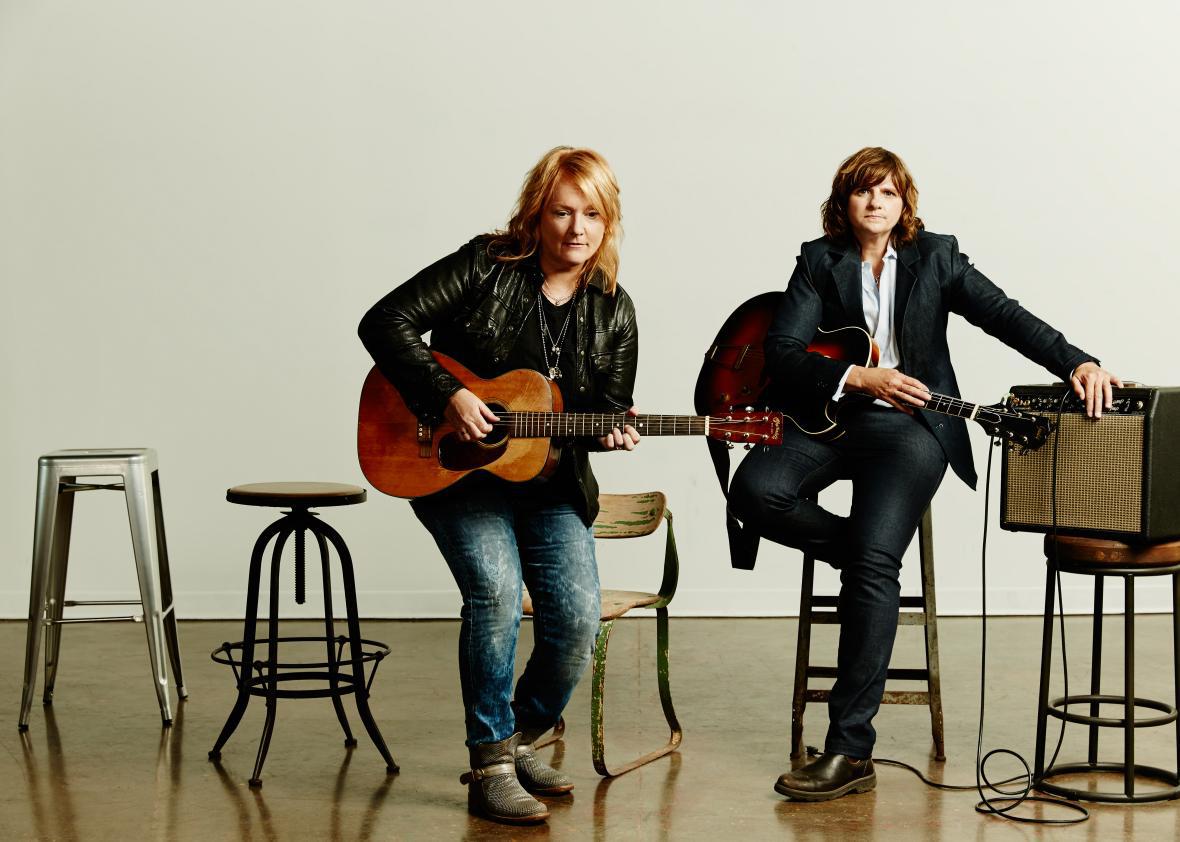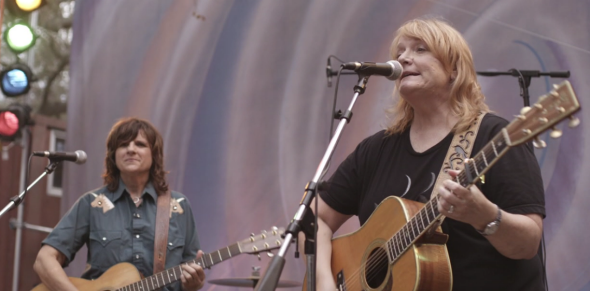It was with some trepidation that Amy Ray of the Indigo Girls stepped onto the set of the Amazon series Transparent. Creator Jill Soloway had invited Ray, along with her folk-rock act’s other half, Emily Saliers, to play themselves, performing their fan-favorite “Hammer and a Nail” in an episode largely set at an all-women music festival, which the show’s central character, transgender woman Maura Pfefferman (Jeffrey Tambor), attends with her two daughters.
Some viewers may note that the fictitious Idyllwild Wimmin’s Music Festival in “Man on the Land,” the ninth episode in Transparent’s second season, is very obviously a send-up of the real-life Michigan Womyn’s Music Festival, or “Michfest,” which staged its final gathering in August after 40 years. Indigo Girls, who played Michigan many times, refused to perform at the last festival because of the organizers’ policy that only “womyn-born-womyn” could attend. Over the years, many trans women participated in the weeklong, clothing-optional convergence of music, art, and politics, but founder Lisa Vogel never fully welcomed them.
“When I first read the script, we had already said we’d do it,” said Ray, who called me last week from Virginia, where she was about to play a gig with Tedeschi Trucks Band. Ray, who hadn’t seen the final episode at that point, said, “I was extra sensitive, because I didn’t want anything to come across as disrespectful about the festival.” Though she and Saliers vehemently disagreed with Michfest’s trans policy, Ray said, “That doesn’t mean we don’t love the people who ran it. It’s been a really important part of my life.”

Photo courtesy of the Indigo Girls
Having broken bread with many of Michfest’s pioneers—or “elders,” as Ray calls them—over the years, she had come to view the event as a microcosm of the feminist and queer movements. “Every conversation has been had on that land, and that’s been really important,” Ray said. So, too, is founder Vogel, who was a brash 19-year-old in 1976 when she acted on her idea that women could build stages, set up and play their own instruments, and make a go of an event geared solely to female concertgoers. It is an act Ray calls “mind-blowing” for the time.
With such thoughts in mind, during the filming she shared her concerns with Soloway, who consequently tweaked some of the dialogue. “I noticed that as they were working through the lines, they were really changing and shifting things around to be sensitive to the fact that Michigan had a reverence to it,” said Ray. “At the same time, they were trying to maintain the goofy humor of the show, which can range from absurdity to dry wit.”
In the end, the show’s irreverence proves a bit ruthless where Michfest is concerned. “Some of you may know me from my Drumming Away Racism group,” says one workshop leader as she commences a healing circle in an incense-filled tent.
That type of lesbian-feminist blasphemy has its place, Ray said. “I don’t always want to be the party-pooper who is politically correct and can’t laugh at anything, especially myself, because I don’t feel that way about life. Certainly, Emily and I have been made fun of so many times,” she added. “So I kind of just let go and said, I’m going to trust that people will see the good intention in the whole project, knowing that there was a risk.”
A self-described fan of the Pfefferman clan, there was another reason Ray was keen to be involved. “There were a large number of queer people involved in it—writers, PAs, and directors who would not normally get that opportunity in Hollywood. They’re making a statement in the way that they run the show, which is a big deal.”
The series takes a haunting turn throughout the season in several scenes that reach back into the past to highlight the Pfefferman family’s roots in Weimar Germany. In the episode in which Ray and Salier appear, Maura begins to feel threatened—almost hunted—because of her presence in a literal no-man’s land. Her story is juxtaposed with one about a group of trans women, gay men, and intellectuals who are dragged out of a Berlin institute by the Gestapo.
Ray watched the episode after we spoke and emailed me her thoughts. Calling it “a mixed bag” in terms of the depiction of the women’s music festival, she nevertheless said that in the end, “I was really moved, because the trajectory worked for me.” In particular, Ray described the Nazi imagery as “brilliant and intense,” even though “I think it will piss a lot of people off.”
Overall, Ray was glad to participate in the show, which she thinks is making incremental inroads with the public’s perception of transgender people. “I hope that people who are very much on the outside of these experiences will broaden their horizons. I think the show has already done that—for people who knew nothing about transgender stuff, I think it opened their eyes.”
As for Ray’s star turn in Transparent, she said, “I love the show and just felt it would be fun to do. We didn’t have to act; we just had to be ourselves, which is all I can do.”
Previously on Slate:
Why Did Maura Pfefferman and Her Daughters Go to a Trans-Exclusionary Wimmin’s Festival?
“I Want to Stay and Help Make Change”: Amy Ray on Indigo Girls’ New Release
